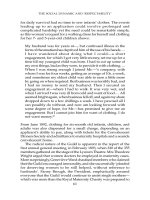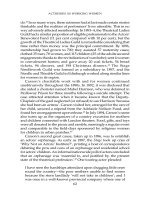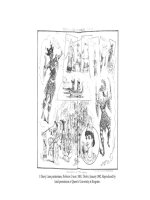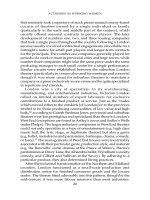ACTRESSES AS WORKING WOMEN 164
Bạn đang xem bản rút gọn của tài liệu. Xem và tải ngay bản đầy đủ của tài liệu tại đây (25.83 KB, 1 trang )
ACTRESSES AND THE MISE EN SCÈNE
Let the graces be stark naked, or vest them only with flowing
drapery, and they may be as chaste as Susannah. Put them in
drawers or tights and they become prostitutes.79
It is doubtful that science could verify tights’ stimulating effect on
those who wore them, but the excerpt clearly demonstrates the
centrality of tights in fetishists’ fantasies of pleasure.
Aside from their fetishistic effect, the skirts and tights of the ballet
had an aesthetic function to simulate nudity. Tights were always worn,
so there was no pretence in performance of actual flesh being exposed,
yet while the optical trick provided steady encouragement to enjoy
the pretended nudity, the possibility that the taut silken leggings might
give way to their bulging contents provided steady titillation in hopeful
anticipation of real nudity. The tendency to illustrate danseuses
barefooted, as with Taglioni in La Sylphide (by Deveria) and the Three
Graces (Taglioni, Elssler, and Cerrito, by Chalon) suggests that the
artist’s eye (and probably some spectators’) routinely removed the
ballet shoe and tights to reveal the foot and the leg as actually nude. It
follows that if the foot and leg are ‘read’ as nude then the genitals
must also be bare, since the missing garment—as erotic texts so often
stress—would have extended all the way from toe to waist.
This convention of ‘clothed nudity’ in ballet was adopted wholesale
into extravaganza, pantomime, opera bouffe, burlesque, and music
hall acrobatics. The female leg, naked in tights, became synonymous
with the female performer, with enjoyment, and with the theatre itself.
In the 1870s, London’s Oxford, Alhambra, Gaiety, Princess’s,
Canterbury, and Olympic all used leg motifs on the covers of
programmes; in the 80s the Folly and Drury Lane adopted the same
convention, and in the 90s the Empire continued what must, by then,
have been a tradition. Provincial theatres followed suit.
The theme of clothed nudity giving way to actual nudity was
articulated in music hall lyrics.80 In 1896, Lady Mansel sang in the
music halls about a dancer whose tights burst; the popular refrain
‘and what I saw I mustn’t tell you now’ was presented as evidence
against the Oxford when its licence came up for renewal before the
LCC.81 Erotica did not obscure the ‘seen’ with such coy double
entendres, but described the consequence of bursting tights explicitly.
In Memoirs of a Russian Ballet Girl, a sado-masochistic novel of 1901,
the corps de ballet of a Grand Duke’s dancing academy are
deliberately fitted out with tights that will split at the rear when
the dancers bend. These revealing, self-destructing costumes are
135









